Colonial Streaks in Kant's Philosophy of Judgment (Based on Spivak`s Ideas)
Author(s):
Article Type:
Research/Original Article (دارای رتبه معتبر)
Abstract:
The success of British colonial rule during the nineteenth century was not only dependent on the threat of military force, but also on the sophisticated use of rhetoric so the civilizing mission of Europeans established based on culture as rhetoric and followd 18th and 19th century literature and philosophy. This superiority was followed by 18th and 19th century`s philosophy and literature. Emanuel Kant, the great philosopher of 18th century, in his book “Critique of Judgment” that its first part is the Critique of Aesthetic Judgment and its second part deals with the Critique of Teleological Judgment. Kant in this book introduced a subject, that achieves beauty and sublimity and finality under special conditions; however since in Kant’s view, such understanding is not specific to all people, this question arises for critics that whether there is a sign of racism and colonianism in third criticism of Kant Subject. So, the main question of this article is that is there any colonial and racism streaks in third critique of Kant. This article based on the ideas of the post-colonial critic and theorist, Gayatri Chakravorty Spivak, is a well-known scholar in diverse fields of post-colonial research, examines and answers this question. Spivak believes that Kant’s theories in two cases, use racism and colonialism; first in analysis of sublimity he states that raw man can understand sublimity as a terrible conceptions because he is not educated and cultured; secondly, in finality discussion, considers Australian indigenous inhabitants without humane nominality. Therfore, the indicating subject of universality or Kant Human does not refer to all humans, but only pays attention to burgeous educated man subject of European Enlightenment period as providing a part of rational principles of Imperialism development.
Keywords:
Spivak , Kant , Sublimity , Kantian subject , Teleology
Language:
Persian
Published:
Research in Theoretical Politics, Volume:13 Issue: 24, 2018
Pages:
173 to 198
magiran.com/p1901917
دانلود و مطالعه متن این مقاله با یکی از روشهای زیر امکان پذیر است:
اشتراک شخصی
با عضویت و پرداخت آنلاین حق اشتراک یکساله به مبلغ 1,390,000ريال میتوانید 70 عنوان مطلب دانلود کنید!
اشتراک سازمانی
به کتابخانه دانشگاه یا محل کار خود پیشنهاد کنید تا اشتراک سازمانی این پایگاه را برای دسترسی نامحدود همه کاربران به متن مطالب تهیه نمایند!
توجه!
- حق عضویت دریافتی صرف حمایت از نشریات عضو و نگهداری، تکمیل و توسعه مگیران میشود.
- پرداخت حق اشتراک و دانلود مقالات اجازه بازنشر آن در سایر رسانههای چاپی و دیجیتال را به کاربر نمیدهد.
In order to view content subscription is required
Personal subscription
Subscribe magiran.com for 70 € euros via PayPal and download 70 articles during a year.
Organization subscription
Please contact us to subscribe your university or library for unlimited access!


